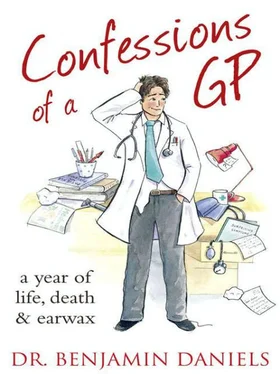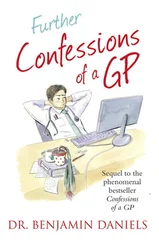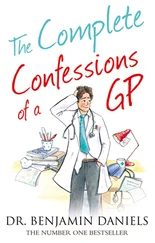I decided not to go with my common sense and instead we carried on with the chest compressions and mouth to mouth. This was not because I thought that there was any chance of this woman surviving, but because her distraught-looking husband needed to feel that absolutely everything that could be done was being done. The other concern was a legal one. Once you start a treatment, it can be a thorny matter about deciding to stop. I wasn’t in the UK and from a litigious viewpoint, it was a much safer decision to carry on with the pointless CPR. I had a big crowd of onlookers now and they were every bit an audience as our performance was purely for show. The ambulancemen did eventually arrive but, to be honest, they were fairly useless. They didn’t have much equipment and they couldn’t intubate (put a tube into the lungs to help breathing). They didn’t even have a defibrillator (machine to give the heart an electric shock). Instead, they scooped her up on a stretcher, plodded along the beach to the ambulance and drove her to the hospital, continuing to resuscitate in much the same ineffectual way as me.
That beach really was gorgeous and although in no hurry to die myself, I can’t think of a more perfect place to expire. To drop down dead on golden white sands after a swim in crystal clear waters seems a rather nice way to go. If it were me, I wouldn’t then want some sweaty pasty English bloke to spend an hour jumping up and down on my chest in front of a crowd of nosy onlookers.
One of my female patients has begun visiting me twice a week. During our consultations, she pulls in her chair very close to me and strokes my leg. She always kisses me when she leaves and has taken to buying me presents despite my objections. During our last consultation, she attempted (unsuccessfully) to slip me an envelope full of cash.
Ethel is 93 and her behaviour is generally thought to be a bit ‘batty’ and ‘comical’ rather than anything more concerning. Were I a young female GP receiving this sort of attention from a male patient, everyone would be a bit more concerned, but given that Ethel isn’t exactly threatening my personal safety or my marriage, her affections remain nothing more than a source of amusement to the receptionists and other doctors.
Generally speaking, receiving gifts from patients can be awkward. Sometimes patients simply want to say thank you for putting in that extra bit of effort, but I generally feel uncomfortable receiving gifts. I’m being paid very well to look after my patients and so shouldn’t really expect an extra incentive such as a nice bottle of wine at Christmas to do my job. I feel especially bad if a patient who I know doesn’t have much money buys me an expensive gift that they can’t afford. Declining the gift can cause offence but it is a difficult area.
Sometimes gifts put an odd slant on the consultation. I received a very expensive bottle of champagne from one of my patients one Christmas. The bottle was very happily received (and consumed), although I was slightly surprised as the patient wasn’t someone that I saw very regularly. Two weeks later I received a form to complete with regard to his entitlement to incapacity benefit payments. The patient had been on long-term sick benefits for a long time but I did question his genuine need to be signed off work. I filled in the form honestly but I wonder whether the bottle of bubbly was an attempt to be a bit of softener.
One of my colleagues once got left the entirety of the contents of a patient’s house in her will. He had a big dilemma as to whether he should accept this and, after much debate, eventually decided to sell her belongings and give the money to charity. After spending a long weekend trawling through her possessions, he ended up having to fork out £200 to have everything taken away by a house clearance company, as there was nothing of any value whatsoever. He wasn’t best pleased.
I can’t speak for other doctors, but personally if a patient ever wants to thank me, I would love a card or letter expressing this. As with us all, it is nice to be told that we are doing a good job sometimes, even if it is simply what we are being paid to do. I’m not that keen on wine and chocolates make me fat. Envelopes of cash are a bit dodgy and will get me struck off, so a card is just right.
I know very little about economics and, to be honest, I don’t really understand exactly why interest rates go up and down. My main concern is how much my mortgage payments are each month. Fortunately for us, we have the Bank of England to make decisions about interest rates. It is an independent organisation, unrelated to the ambitions of individual political parties and politicians, which works to maintain the stability of the economy. I have no idea who the individual members of the bank committee are. I imagine them to be wise old men with white beards who sit at a round table somewhere, possibly in a bank vault or a castle. Wherever they work from, the important thing is that as a nation, we generally seem to trust that the decisions that they make are the right ones and ultimately for the benefit of us all. I’m relieved that politicians who know little about economics aren’t allowed to make dangerous decisions such as slashing interest rates to win votes. Unfortunately, we are not so lucky with regard to decisions made about healthcare.
All the recent big policies with regard to the NHS appear to have been to win votes rather than actually improve the service that it provides. They have been made by politicians who have never worked in a medical setting and are fairly healthy so rarely use the NHS. They are policies targeted to impress the important voters. People who are genuinely vulnerable and unwell don’t tend to vote and certainly don’t swing elections. This means that the elderly and mentally ill are pretty much neglected. The worried well, however, are a much more important voting population. Young healthy commuters are the least wanting with regard to health requirements, but the politicians need their votes. Opening surgeries on Saturday mornings, four-hour A&E waiting times and having choice over which hospital a GP refers you to are all examples of this. They are not necessarily bad ideas, but they have all been poorly thought through and instigated. Most of us who actually work in the health service could think of many more deserving causes to throw millions of pounds at.
My solution would be to have an equivalent of the Bank of England for the NHS: a small expert organisation that could basically manage the NHS and help make the important decisions about how taxpayers’ money is best spent on our health. It would be independent and not be affiliated to a political party or be directly affected by general elections. It could be made up of experienced nurses, hospital doctors, GPs, managers and patients who all have very recent and direct experience of being at the coalface of the NHS.
It may seem slightly undemocratic to have our NHS not directly managed by the elected government, but the elected politicians are clueless morons and keep fucking things up! Would it work? I don’t know. Would it just add another tier of ineffectual managers? I hope not. Would it be worth a try? I think so.
I know I can appear judgemental in my description of some of my patients. I don’t mean to be. I try to treat all my patients equally and fairly. If I’m judgemental at times I think that it is not because I’m a doctor but simply because I’m human.
As a doctor, it can be difficult not to allow my own personal morals to reflect on how I view and treat a patient. For example, one morning I spent a long, tearful consultation with a lovely couple in their late thirties who had just failed in their fifth attempt at IVF. They had run out of money and hope and were emotionally distraught at the recognition that they would never conceive their own children. Later that morning, a woman came in requesting her fifth abortion. I don’t have any ethical problem with abortions, but I did find myself judging her. Did she realise how hard it was for some people to conceive? Did she consider how much it cost the NHS each year to perform so many abortions? Contraception is free and readily available in this country. How could she have been so careless so many times?
Читать дальше
Конец ознакомительного отрывка
Купить книгу











![Benjamin Franklin - Memoirs of Benjamin Franklin; Written by Himself. [Vol. 2 of 2]](/books/747975/benjamin-franklin-memoirs-of-benjamin-franklin-wr-thumb.webp)
![Benjamin Franklin - Memoirs of Benjamin Franklin; Written by Himself. [Vol. 1 of 2]](/books/748053/benjamin-franklin-memoirs-of-benjamin-franklin-wr-thumb.webp)